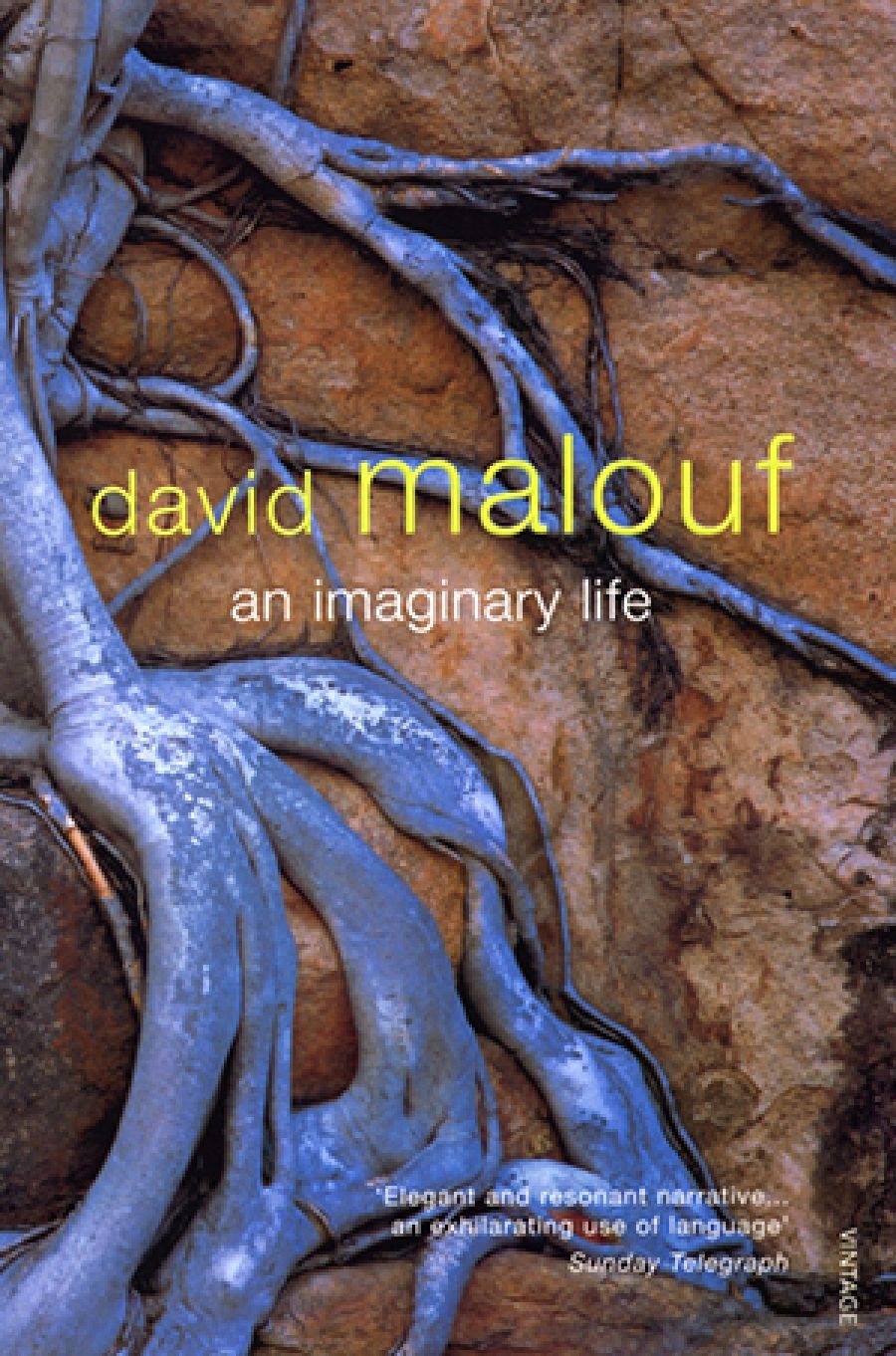
- Free Article: No
- Contents Category: Fiction
- Review Article: Yes
- Online Only: No
- Custom Highlight Text:
The title of David Malouf’s novel, An Imaginary Life, must be read three ways. Most obviously, the novel is an imaginative recreation of the last years of the life of the Roman poet, Publius Ovidius Naso (Ovid), who was exiled to a village on the Black Sea by the Emperor Augustus in the last century BCE. The life is imaginary because it imagines – most successfully – the circumstances of this exile.
- Book 1 Title: An Imaginary Life
- Book 1 Biblio: Chatto & Windus, $12.25 pb
- Book 1 Readings Link: https://www.booktopia.com.au/an-imaginary-life-david-malouf/book/9780099273844.html
Again, however, this sense of the imagination is inadequate to the complexity of the book. It is true that Ovid lives during the brief term of the novel's action largely within his own mind, but within this scope he uses his imaginative powers to create the whole of human existence, from the dawning of consciousness to the realisation of its furthest potential. He is driven back by circumstance into his imagination, but through his imagination he creates a truer, a fuller, life than he has been capable of while he has been controlled by circumstance.
This novel is essentially didactic. Its purpose is to convince us that not only man, but the whole of creation, comes into existence by imagining itself. The key to this doctrine is a passage where Ovid wanders out from the village at the beginning of Spring. The barren landscape in which he finds himself has none of the attributes of the Springs which he has known, but as his memory reminds him of this so it recreates what he has lost:
Suddenly my head is full of flowers of all kinds. They sprout out of the earth in deep fields and roll away in my skull. I have only to name the flowers, without even knowing what they look like, the color, the shape, the number of petals, and they burst into flood, they click open, they spread their fragrance in my mind, opening out of the secret syllables as I place them like seeds upon my tongue and give them breath. I shall make whole gardens like this. I am Flora. I am Persephone. I have the trick of it now. All it needs is belief.
Immediately after this, he plants garden seeds in the village, so bringing to it an irreversible change in its possibilities of life. This change the novel demonstrates is an analogy for the way rocks have chosen to become animate, men have chosen to make their landscapes, Augustus has chosen to make his age. Malouf is close to unique among his contemporaries in an age of absurdity for his belief in the power of the individual will as realised through imagination.
The central element of the passage I have just quoted is however not the imagination but the tongue which gives it form in names, in language. The flowers come into being as Ovid names them. The life of the villagers takes shape for him as he learns their language, and thus enters into the relationship with the earth and with the spirits of the air that they have shaped through the centuries. Finally, he encounters the Child, a wild boy who has been raised among the beasts. As Ovid teaches the Child his language, so he creates a life which is beyond either of them but which in its shaping realises the past of each of them. Through the Child, Ovid recovers his own past and learns how to meet his own and only future, death.
At this stage of the novel the story moves both forwards and backwards. The child is the symbol of Ovid's posterity, his undiscovered future, the only afterlife he will have. But through the Child, who resembles a dream or spirit creature – an imaginary life – of his own youth, Ovid also comes to terms with his own life, his brother's death and the antagonism he himself had felt to his father. Through the Child he comes to terms with his own past, just as finally he learns to let go his hold on the present and move into the unknown, fleeing with the Child into the wilderness where he dies.
It is at this point that the novel is less than a complete success. Malouf shows us how, in taking the Child into the village, Ovid disturbs the customary life in a way which is immediately destructive, so that finally the antagonisms which he arouses force him to flee. Yet, while we can accept this on the literal level, its symbolic meaning is unclear. By discovering the Child and coming to terms with his past, Ovid frees himself. This freedom offers a possibility of growth to the village, but it also, like all change, threatens the present, and so is rejected. The natural catastrophe would be tragic, with the village in its conservatism destroying the one chance it has of survival. Instead, Malouf chooses a romantic denouement, with Ovid and the Child turning their backs on society to seek death and salvation in the wilderness.
Despite this structural weakness, however, the novel remains powerfully stimulating to thought and imagination. The action is never obscured by the symbolism, but remains realistic, yet the narrator’s response to it constantly forces us to look for further meaning. In this sense the novel, although international, is also peculiarly Australian. The author responds with imaginative conviction to the desert wastes and to the task of creating a civilisation, a meaning, out of nothing except memories. In animating this world, Malouf shows how humanity creates itself, producing gods from its own need to create meaning. Through this vision, he recreates a tradition which is both classical and profoundly futuristic.


Comments powered by CComment